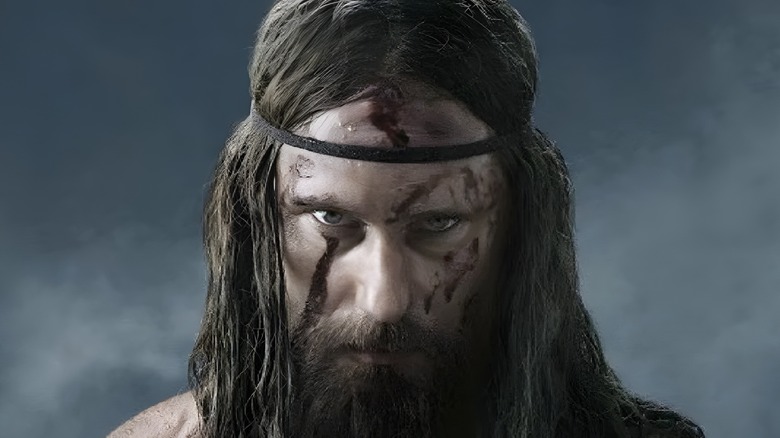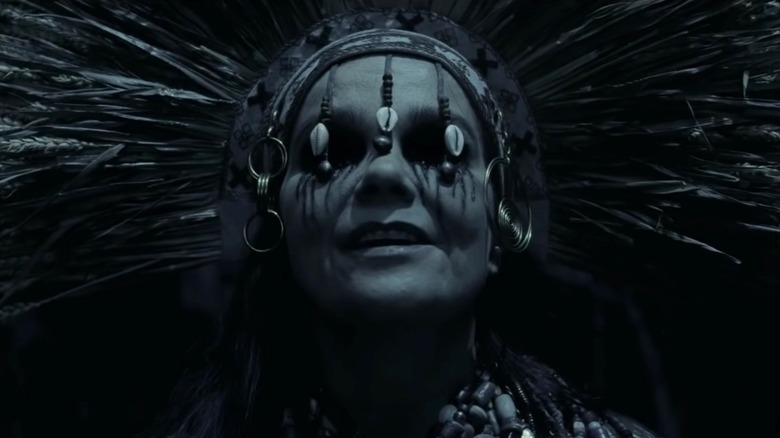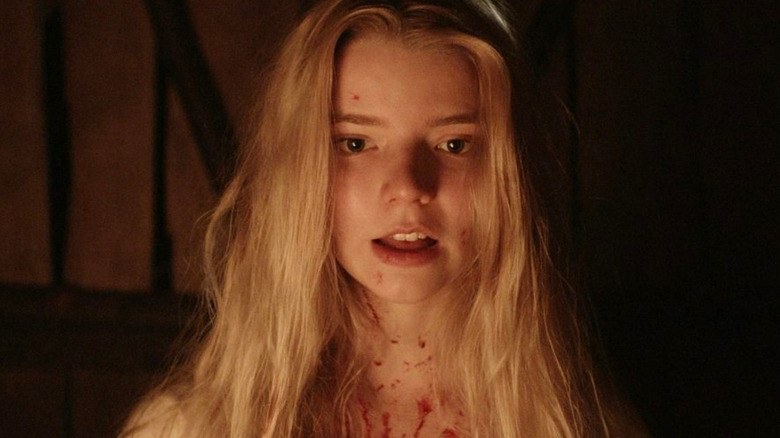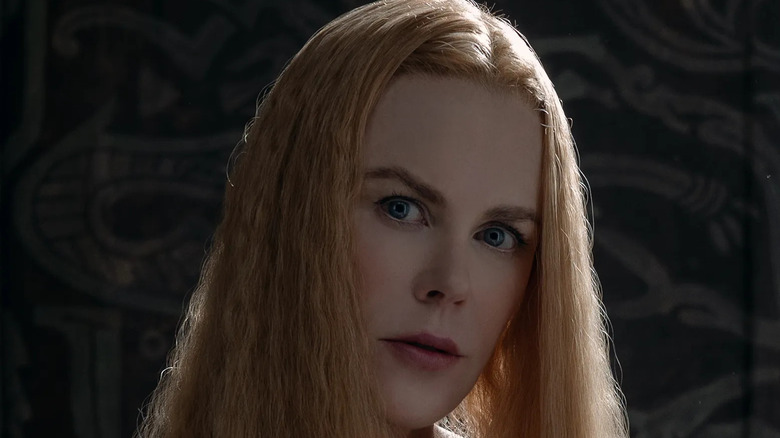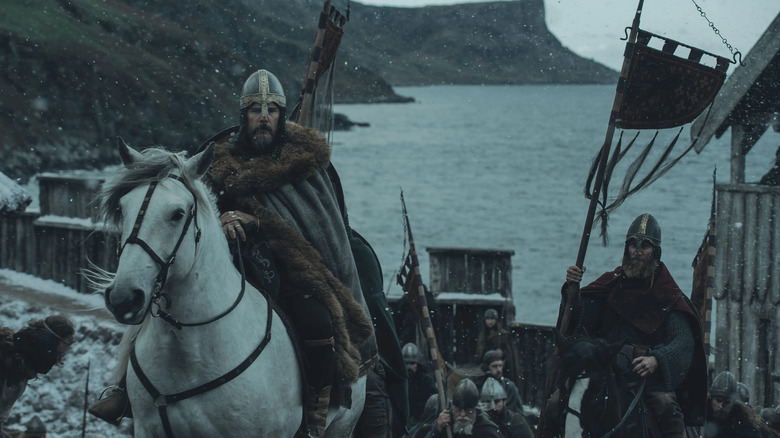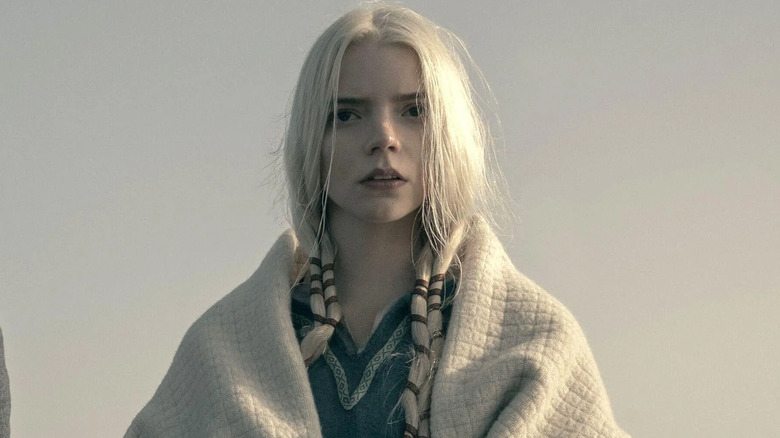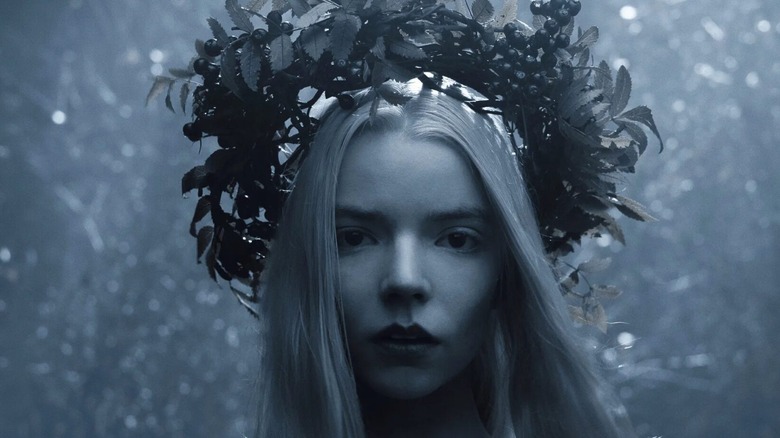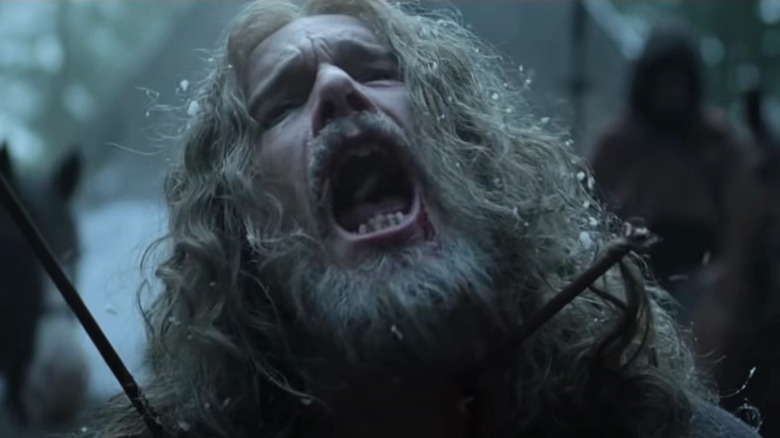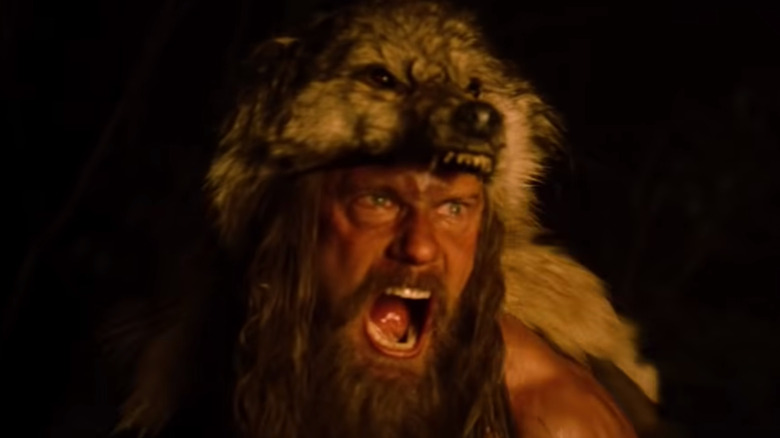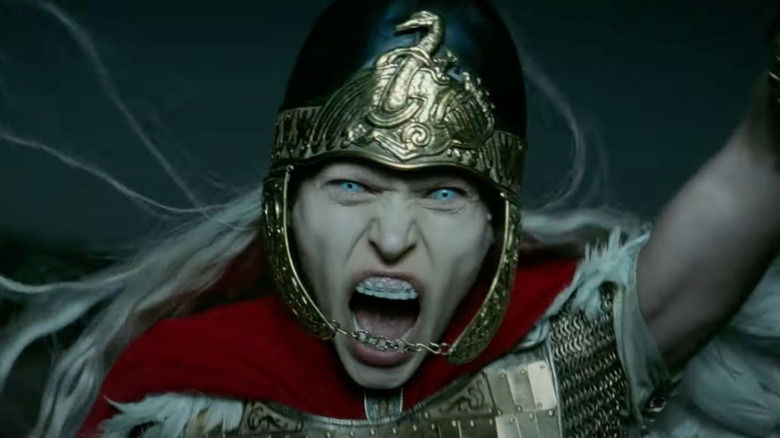Biggest Unanswered Questions From The Northman
Director Robert Eggers's latest film is out now –- the equal parts hack-and-slash action and arthouse spectacle known as "The Northman." It's worth of at least one viewing, and likely more, if only to soak in the brilliantly directed and acted sequences of mysticism, prophecy, and extreme emotionality. "The Northman" continues Eggers's streak of expressionism and thematic surrealism, so boldly on display in his previous two films, "The Witch" and "The Lighthouse."
By the end of "The Northman," the revenge narrative -– which on the surface may seem boilerplate –- ultimately leaves viewers with a handful of lingering mysteries and parts open to interpretation. The seemingly simple tale of a Viking out to avenge the death of his father and abduction of his mother places its ducks (or should we say ravens) in a row in a predictable manner, but leaves room in between for multiple interpretations, even casting doubt on who exactly is the story's hero. To help sift through the tale's many visions, fits of madness, and drug-induced hallucinations, we'll discuss the biggest unanswered questions From "The Northman."
Is magic real?
"The Northman" takes a cue from a number of period pieces with mythological underpinnings and keeps its supernatural side deliberately ambiguous. Like "Valhalla Rising" and "Troy," Eggers's newest film bends over backward to make the gods and mythology a part of its story without ever actually confirming their existence. Virtually every major character in the movie mentions their patron deities, be they Odin, Freyr, Freya, or Olga's unspecified "Earth Gods," repeatedly, offering sacrifices to them and beseeching them for aid in battle –- and the gods do answer. Often.
The movie features a number of divine beings, including a Valkyrie, Odin, and even a bona fide zombie (likely a dis or draugr), and many have a direct effect on the plot. Amleth's retrieval of the Night Blade provides a number of effective examples. The Viking first learns of the sword during a vision in which one of the fate-gods, the Norns, tells him to seek it. He then learns of its precise location from the severed head of his former friend (Heimir The Fool, played by Willem Dafoe). As the goddess and head predicted, the sword was indeed real and indeed right where expected. Even further, the sword's alleged stipulation that it can only be drawn from its scabbard at night proved true a number of times, both for Amleth and another Viking who attempted to wield it.
Or are there only magic mushrooms?
Though the effects of the gods and sorcery seem to push forward the plot of "The Northman," the film also provides a mountain of evidence that all the supposed wizardry and divination may have one simple explanation: mushrooms. The movie's first half repeatedly hints about the use of psychedelic substances before and during characters' communions with supernatural beings. When young Amleth and his father, Ethan Hawke's King Aurvandil, join Heimir in a ritual that sees them on all fours and howling like wolves before seeing into another realm –- one containing the mythical "Tree of Kings" -– the pair first lap up a soup of Heimir's devise. Though its recipe is never stated, its opaqueness and clumps (besides the obvious bones) are consistent with mushroom or plant ingredients. This likely includes Amanita mushrooms or Henbane, the most likely sources that actual Viking Berserkers used to achieve their rage-state.
The movie's second half becomes even more explicit with its mycological influences, as Olga informs Amleth in no uncertain terms that mushrooms are the source of some magic. As Olga tells Amleth of her Earth Gods, she plucks mushrooms from the ground and asserts that they are the key to the pair's victory. The pair then dose their enemies with mushrooms, causing them to hallucinate and some to even take their own lives.
Who is Thórir's mother?
Family is an important theme in "The Northman," and in particular what sons inherit from their parents. Amleth sees himself as a true heir to Aurvandil, a living extension of the dead king. When he sees into other realms, he sees himself and Aurvandil connected closely through the branches of the Tree of Kings. His oft-repeated mantra, "I will avenge you, father. I will save you, mother. I will kill you, Fjölnir" provides the scaffolding for his entire existence and purpose, and the way in which he survives the harsh world of Northern Europe circa AD 900 is the same way his father did –- by channeling Odin, flying into a rage, and murdering anyone in his way.
That is why the parentage of Amleth's sworn enemy Fjölnir is so important. We know that Fjölnir had a child with Amleth's mother, Queen Gudrún: the young princeling Gunnar. But Gunnar has an older brother, as well, Thórir. We know Fjölnir is also his father, making the two boys at least half-brothers, but the identity of his mother is never made clear. In the exact minute in which we first see Thórir as a baby, Heimir jokes that Fjölnir and Queen Gudrún were having an affair, and later, Gudrún makes it clear to Amleth that she had indeed always loved Fjölnir and not her husband Aurvandil. If Heimir's jest was true, then Amleth and Thórir are half-brothers -– adding a bit more sting to Amleth's brutal murder of Thórir.
How historically accurate was it?
As with any period piece, and especially with those set in oft-romanticized eras like the Viking Age, "The Northman" was met with immediate appraisals of its historicity. Unlike films such as "300," which were lambasted for their inaccuracies, "The Northman" actually received a swell of praise from prominent historians and media outlets. Eggers and star/producer Alexander Skarsgård tried their best to keep the film true to its source material, and evidently, they largely succeeded.
Neil Price, a professor of archaeology at Uppsala University, Sweden, was one of three Viking Era experts brought on by Eggers to ensure the film's veracity. Price, who has been outspoken in the past about the mischaracterization of Vikings in popular culture, told Time that Eggers "really does an enormous amount of background research. I sometimes wonder whether he needs advisors." Likewise, numerous outlets cited the film's accuracy, Eggers's uncommon commitment to maintaining that accuracy, and how much that level of detail carried even into the film's minutia. Some, in fact, even went so far as to call it "the most accurate Viking movie ever made." For a film with zombies and talking skulls, that is high praise.
Were the characters real Vikings?
In keeping with the movie's steadfast commitment to truthfulness, a number of the major characters in "The Northman" are based on real or allegedly real historical figures. Most notable is the film's main character Amleth, who is based on the supposed real man of the same name. The historical Amleth is one of the most prominent characters in "Deeds of the Danes," a Medieval history tome written by Saxo Grammaticus, though how much of his life was real and how much was mythologized is debatable. Amleth's story also provided the main influence for Shakespeare's Hamlet, who (like Eggers) drew on the story's internecine family tragedy.
Unlike Amleth, Olga does not have a blatant historical parallel, but she does share some similarities with Olga of Kyiv, later known as Saint Olga. Like Olga from "The Northman," the real Olga was also a Slav, lived in the first half of the 10th century, begat heirs from a Viking king, and was infamous for her skill in violence when required. In addition, Gudrún, Fjölnir, Thórir, and Gunnar also bear the names of famed historical or allegedly historical Vikings.
Who are the Earth Gods?
The characters of "The Northman" reference various gods throughout. The two who receive the majority of mentions are Odin, whom both Aurvandil and Amleth regard as their patron deity, and Freyr, whom Fjölnir and Gudrún consider their patron deity. The two gods are well-known within Norse Mythology, central figures whose roles are well-defined (insofar as that is possible for Norse deities). But Olga –- and Olga alone –- mentions another set of gods, those she cryptically refers to as simply the Earth Gods.
Curiously, there is no direct Earth deity in Norse mythology. There is, however, an obscure giantess named Jörd, who was said to be the primordial personification of the Earth (similar to the Greek Gaia). However, since Olga is a Slav (possibly from Kyiv, per her real-world counterpart), Slavic mythology may instead hold the answer to her mysterious worship. Though Slavic mythology is often reduced to patchwork entries, it does still include two deities of the Earth: Mokosh and Veles (or Volos). Both display facets that make them candidates for Olga's worship –- in Mokosh's case, her femininity and protection of women, and in Veles's case, his associations with magic and trickery. It remains to be seen which god Olga draws her strength from -– or perhaps what combination of the three.
Is Fjölnir actually the villain?
Boiling down the plot of "The Northman" to its most basic elements, it is a film about Amleth's quest to rescue his mother Gudrún and kill his uncle Fjölnir -– a wicked, treacherous, power-hungry man who slew King Aurvandil, his own brother. Amleth's quest, therefore, is a righteous one, a hero out to slay a monster and rescue a damsel in distress. The problem with that framework, and Amleth's entire worldview, is that it is based on wildly incorrect information.
In Act I, we witness Fjölnir kill his brother, King Aurvandil, assume his throne, and "abduct" Gudrún. While those do indeed seem evil acts, we later learn that Aurvandil was a warmongering brute of a King, a slave-trader, and a potentially abusive husband. According to Gudrún, Aurvandil had to die in the interest of the people, and Fjölnir was righteous in killing him. Then we find out that Fjölnir was the loving husband that Gudrún always wanted. What's more, when we catch up with Fjölnir, we see him as a fair, hard-working leader who helps his slaves perform tasks, loves his wife, and selflessly defends his family. He does keep those slaves and seems all too eager to force Olga to bed, but he is also far from the entirely evil tyrant that Amleth envisioned him to be. For the most part, Fjölnir seems content to run a modest settlement and farm sheep.
Is Amleth actually the hero?
With Fjölnir's malice cast into doubt, so too is Amleth's virtue. Though the film's protagonist, he far surpasses any of the film's antagonists in narrow-mindedness and brutality. His every action is guided by his "I will avenge you, father. I will save you, mother. I will kill you, Fjölnir" compass, and it leaves little to no room for flexibility, empathy, or kindness. Instead, Amleth spends almost the entirety of the film viciously murdering everyone in his sights –- whether enemies or simple civilians. While the other major characters in his life, such as Olga, Gudrún, and even Fjölnir, attempt to use their cunning or diplomacy to solve their problems (at least as much as Vikings can), Amleth is forever a mindless arrow flying straight, propped up by the winds of unyielding hatred.
We see Amleth aid in the grizzly murders of an innocent village (children included), arrange his victims' corpses into gruesome displays, murder his entire family, and even refuse to leave his campaign behind to help raise his and Olga's children. Unlike Fjölnir, who responds to his loved ones' deaths with ceremonies meant to honor them and guide them to Valhalla, Amleth mourns no one and defiles the dead in order to incite panic. Not the most heroic of traits.
Is Gunnar really dead?
Admittedly, this question likely has an answer. It is most likely that Gunnar, the young son of Fjölnir and Gudrún is dead. In the midst of his bloody revenge, Amleth slashes the boy with his sword and Fjölnir drags the boy's motionless body away. But there are a few details that leave the boy's death in doubt, and in a movie specifically about another young boy surviving his father's death and seeking out his killer, Gunnar's survival would have massive implications.
For one thing, we never quite see Gunnar die -– Amleth slashes the boy while he is offscreen. This is decidedly different than every other one of Amleth's vengeful murders: He stabs Gudrún through the heart onscreen, stabs Thórir through the chest onscreen, and decapitates Fjölnir onscreen. It is only Gunnar who meets the sword off-camera, and even then, he merely takes a glancing blow to the torso. Unlike the rest, who were skewered or severed, Gunnar only took a potentially survivable blow –- and multiple other characters survive similar wounds throughout the movie. Then, when we see Gudrún and Gunnar's bodies lain out by Fjölnir, only Gudrún is obviously dead. She is bloody, pale, and covered in dirt, while Gunnar is clean, has more color, and looks more like he is sleeping than dead. Might the cycle of vengeance turn once more for Gunnar?
